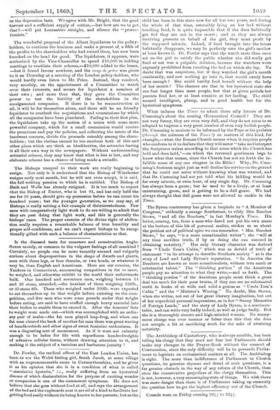The Byron controversy has given a loophole to "A Member
of Congress," evidently a savage Southerner, to vilify Mrs. Beecher Stowe, "and all the Beechera," in last Monday's Times. His letter, coming, too, from a man who dared not put his own name at the bottom of this bit of personal malice, strikes us as about the pettiest act of political spite we can remember. "Mrs. Beecher Stowe," he says, " is a mere sensationalist writer"; she "will at any time sacrifice truth, if by so doing she can succeed in obtaining notoriety." Her only literary character was derived from "Uncle Tom's Cabin," which was as devoid of truth of statement "in its attempt to describe Southern society" as is the story of Lord and Lady Byron's separation. "In America the Beechers are known as mere sensationalists, without true merit or substantial talent." The "thinking portion" of the American people pay no attention to what they write,—and so forth. The "thinking portion" of the American people must think a great deal too much for their poor brains, if they can see no substantial merit in books of so wide and solid a genius as "Uncle Tom's Cabin" and the "Minister's Wooing." No doubt, Mrs. Stowe, when she writes, not out of her great literary imagination, but out of her superficial personal impressions, as in her "Sunny Memories of Foreign Lands," and the story of Lady Byron, is a sentimen- talist, and can write very badly indeed, as well as judge badly. But she is a thoroughly sincere and high-minded woman. No anony- mous charge was ever meaner or falser than this that she does not scruple a bit at sacrificing truth for the sake of attaining notoriety.






























 Previous page
Previous page